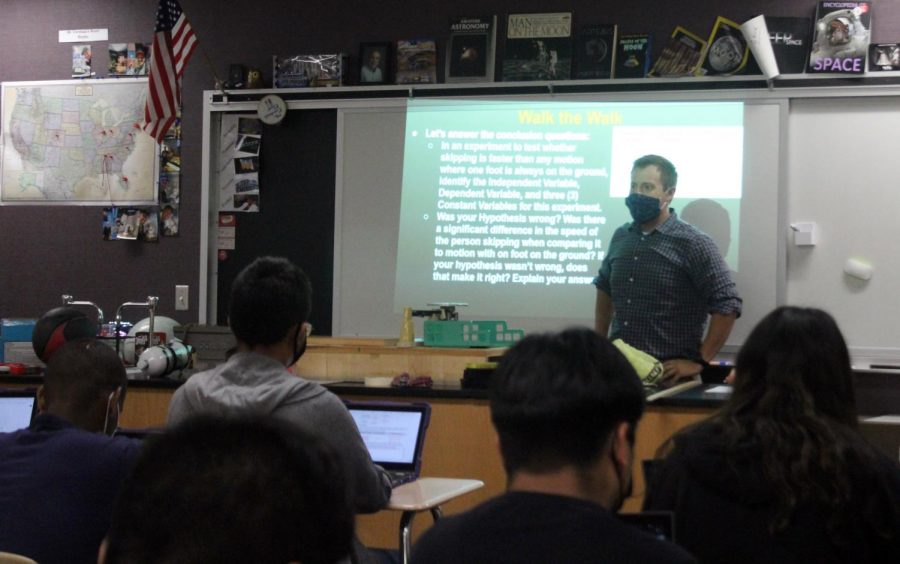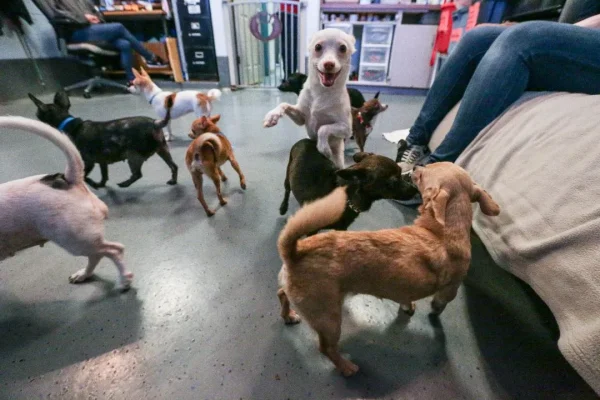Should the average American be worried about climate change?
Science teacher Joseph Cardoza is passionate about talking about climate change.
September 9, 2021
Amidst all the climate change denial in the U.S, a couple questions come to mind. Should the average American even be worried about whatever climate change is? What even is climate change? Has it been blown out of proportion? And is it even real? Or is it really all a hoax like some would have us believe?
We constantly hear scientists and activists say the phrases “climate change”, “global warming” etc. but what really is all that?
Joseph Cardoza, our physics teacher and robotics coach, has studied in the science field for years, and has been involved in numerous scientific endeavors including exploration of the moon, rocket science etc.
According to Cardoza, climate change today is an effect of humans on the environment; and global warming doesn’t just mean the earth is warming but that the extremes are getting much worse, and a lot more frequent. As we’ve seen all around the world with the wildfires, record breaking snowfalls, storms, floodings, cyclones, hurricanes, and a lot more just in 2021.
Climate change is the long-term alteration of temperature and typical weather patterns, which includes global warming and the “side effects” of warming. Global warming refers mainly to the Earth’s rising surface temperature.
A United Nations report refers to the danger this poses on earth as a “code red for humanity.”
Excess carbon dioxide, along with other greenhouse gases, are the main driver of climate change. The burning of fossil fuels (such as coal, oil and gas) in the Transportation, Electricity production, Industry, and Commercial and Residential industries were responsible for 90% of greenhouse gas emissions. While agricultural emissions from livestock such as cows, agricultural soils, and rice production were responsible for 10% of greenhouse gas emissions.
Nitrogen oxide is another gaseous air pollutant that plays a big role in climate change and environmental pollution. According to EPA (United States Environmental Protection Agency) These gases form when fuel is burned at high temperatures, and is emitted by automobiles, and various other vehicles, as well as industrial sources such as power plants, industrial boilers, cement kilns, and turbines, which are all human driven. Nitrous oxide molecules stay in the atmosphere for an average of 114 years before being removed by a sink or destroyed through chemical reactions. The impact of 1 pound of N2O on warming the atmosphere is almost 300 times that of 1 pound of carbon dioxide.
Most of the nitrogen oxides released in the U.S. are due to human activity from the burning of fossil fuels. Although earth’s climate has gone through many changes before, and regardless of humans, our burning of fossil fuels in transportation and industry increases the rate of global warming and climate change at an alarmingly high rate.
According to Cardoza, the average American should 100% be worried about climate change, seeing as the effects of it have directly impacted our everyday lives and livelihoods.
One important area that’s been significantly impacted by the effects of climate change is agriculture. There’s been a significant reduction in crop yield in the U.S over the years, due to droughts, floods and extreme temperatures caused by climate change and global warming.
According to EPA, crops grown in the United States are critical for the food supply here and around the world, and U.S. farms supply nearly 25% of all grains (such as wheat, corn, and rice) on the global market. Changes in temperature, atmospheric carbon dioxide (CO2), and the frequency and intensity of extreme weather could have even more significant impacts on crop yields over time, which will greatly affect the income of farmers, and food supply all over the world.
Heat waves, which are projected to increase under climate change, could directly threaten livestock, droughts may threaten pasture and feed supplies, and climate change may increase the prevalence of parasites and diseases that affect livestock.
Another area of the average American’s life that will continue to be affected by climate change is natural disasters, and extreme weather.
From the years 2010-2019, there were some 115 devastating natural disasters that cost the United States at least $1 billion in damage and greatly impacted the lives of those who lived in those regions. Some examples of these disasters are; Oklahoma’s mile-wide EF5 tornado on May 20, 2013, that killed 24 people and damaged more than 300 homes, Hurricane Joaquin’s 27 inches of rain in South Carolina in October 2015, Hurricane Dorian’s storm surge and high winds damaging North Carolina’s Outer Banks in September 2019, an estimated 349 tornadoes tore through the South and East in the three-day period, killing 321 and becoming the costliest tornado in U.S. history, and so many more.
Even just in 2021 the United states and Canada have found themselves overwhelmed with needing to fight multiple wildfires (which are appearing more intensely and frequently as global temperatures rise), within their respective borders, despite sharing wildland firefighting resources and developing their wildfire response plans for years. This year has demonstrated weaknesses in those plans, with 37,803 fires in the U.S in 2021 alone.
There’s so much more to the issue and effects of climate change, but some things are for certain; Climate change is absolutely real, and every American, everyone in the world honestly, should be worried about it and trying to look for ways to slow down our contributions to its acceleration. The main contributors to the burning of fossil fuels and the deterioration of our planet are the big industries which continue to push the narrative that it is all a hoax, all for their own financial gain. They need to be held accountable otherwise it likely won’t be getting any better or slowing down anytime soon.
As Cardoza said, “these issues aren’t only NOT being blown out of proportion by the media, but we’ve not even been made to understand the scale of it quite enough at all. In fact it needs to be the only thing anyone is ever talking about ”.
Through all the numerous issues humans face uniquely all over the world, climate change is one issue that we all face universally, regardless of where we’re from or where we live. If major changes are made to help decrease, or even reverse these issues, every living thing on earth will feel the effects of it, much worse than we already do now.
One thing Cardoza would like every American and student here at Ben Davis to think about when they think about Climate change, is that it will affect them but also they can help, not only by being cautious with where/how they source their goods, recycling etc. but also by voting in legislators and government officials that recognize these issues, and will put processes into place where the 100 companies that are responsible for more than 70% of pollution no longer get to do so as much.













